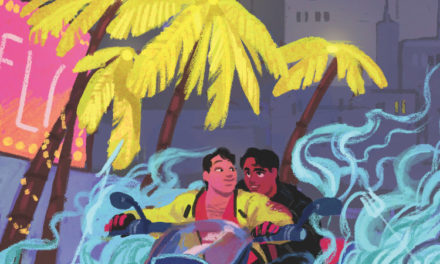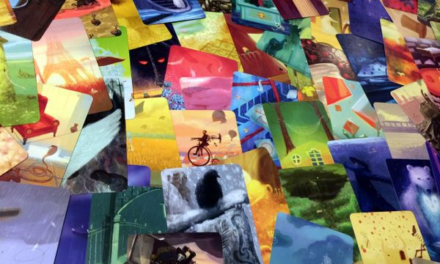Sprinklings of Truth: T.L. Huchu on Writing With and Around Superstition
Issue 15: Superstition | 1,849 words

T.L. Huchu is a Zimbabwean author, now based in Edinburgh, Scotland, whose works include The Hairdresser of Harare; The Maestro, The Magistrate and the Mathematician; the Edinburgh Night Series; as well as several short fictions featured in publications such as Lightspeed and Interzone magazines.
When reading the first novel in the Edinburgh Night Series, we were immediately charmed by the main character Ropa, a ghost talker and crime solver. As we continued reading subsequent books, another key element that pulled us in was the magic that steers the world. In the series, the practice of magic takes various forms—one, for example, that’s institutionalized and scientific versus another rooted in older, ancestral traditions. The difference in approaches ultimately results in deep tensions between characters.
In our lived world, superstition is often treated like that older, traditional magic—it can be thought of as irrational, undefined or as an unexplainable reflexive action (anyone regularly throw salt over their shoulder?).
We didn’t want to confine superstition to this perspective. So, in addition to our general interest in Huchu’s writing practice, we wanted to hear his take on the theme of superstition, particularly because of how, in his works—both in the Edinburgh series and short stories— he shows the value behind seemingly archaic traditions or practices.
So our interview asks T.L. Huchu specifically about superstition and how he works with it in his art and life.
Speculative City: First, could you tell us a little more about your relationship to superstition?
T.L. Huchu: I am an atheist and a materialist, and I believe that, being apes, we shall never ever be able to fully unravel the mysteries of the universe we live in. This does not necessarily mean that phenomena beyond our understanding result from the supernatural; rather, there are limits to what we can know. There’s a brilliant quote from H.P. Lovecraft, which goes:
“The sciences, each straining in its own direction, have hitherto harmed us little; but some day the piecing together of dissociated knowledge will open up such terrifying vistas of reality, and of our frightful position therein, that we shall either go mad from the revelation or flee from the light into the peace and safety of a new dark age.“
I actually think he was rather optimistic about what we could realistically come to know. Even for a materialist, there’s something spooky and mystical about experiencing this universe. I find superstitious belief fascinating—and the fantastic is our original way of trying to understand the world. There are often sprinklings of truth embedded in superstitions, and they make for cracking stories regardless. And whenever we reach the ever-expanding event horizon of our understanding, we are forced to revert back to that original way of speculating about reality. Thus, I posit superstition to be a fundamental, inescapable characteristic of what it is to be a computationally bounded ape-creature trying its best to figure out what’s going on.
In literature and oral history, magic is often evoked through spells or incantations, a special formula of words. Similarly, some superstitions involve speaking certain words or phrases to ward off misfortune (e.g., bless you after a sneeze) or call on good fortune. As a writer, you work regularly with words. Do you see writing as a way to summon or call things into existence?
You bring us to the dastardly question of language. It has been argued by some people far smarter than me that there are two worlds—the external physical world governed by discoverable scientific principles and the internal, psychological world where the rules seem quite different and much harder to codify. It does seem that, being creatures of language, once something is spoken or written it, slips out of the fuzzy internal world of its author and begins to act on other minds. Here we can allude to Dawkin’s memes. And, since our bodies are of the physical, that idea is then made manifest into a material reality. But what you don’t get is a one-to-one correlation between the idea and the resultant thing. This is because language does not and cannot adequately describe material facts. It is the errors of transmission, those frustrating misinterpretations and accidents that result in the wondrous mutations which drive our evolution.
How would you say superstition appears in your stories, and why?
I’ve already tried to argue, rather inelegantly, that superstition is embedded in the human experience—hell, it’s even fundamental to it. Let us at least try to recall how many things that were once proven, ironclad facts have been cast aside as superstitious nonsense. If I think specifically about the world of the Edinburgh Nights series, in book two, Our Lady of Mysterious Ailments, an argument is outlined that there are different ways of practicing magic—the scientific method versus a folkloric type of magic. There, I used magic as a proxy for worldview, because we never get to glimpse the ultimate reality; we are forever trapped in Plato’s cave. Without arguing for any kind of relativism, I am reckoning with the dumb Victorian notion that there is a certain stable, objective worldview one can take that is superior to any other kind of “knowing.” I reject and seek to subvert the negative connotations around “superstition” and traditional belief. The scientific magicians who hold all the power in the Edinburgh Nights world are every bit as fucked up and ignorant as the traditional practitioners of magic they thumb their noses at. What we call science and reason today will indubitably pass into superstition, and what we may think of as superstition will become science, and that wheel will roll on and on until the last ape of our kind is extinguished from existence.
Regardless of one’s perspective on the mystical workings of superstitions, many seem to, in some way, comfort us or encourage healthy behaviors to help us through challenging emotions, like fear or grief. In “Njuzu,” one of the characters is reminded not to cry after they’ve experienced the loss of a loved one, as doing so would result in unwelcome impacts to the deceased. Often there is a need to, at least temporarily, hold oneself together in an emergency or following a death. In your stories, does superstition serve a practical purpose?
We would be completely paralysed by inaction if we always attempted to build the world up from a solid foundation of irrefutable axioms. Some of the most neurotic, socially-emotionally challenged folks I know are super-smart people who presume that the only legitimate way of engaging with the world is via some kind of ceaseless intellectual analysis. When I was a young child growing up, I was warned that sitting on tarred roads would result in painful blisters spontaneously appearing on my bottom. This terrified me and, to this day, I have a weird aversion to tarmacked surfaces. Now it’s evident to me that, being an 80s, free-range kid who was allowed to roam about my hometown freely until supper time, the adults had to find ways of warning us about the dangers of mucking about in traffic. If they had said, “Cars are dangerous,” that would have meant nothing at all to a ditzy five-year-old. Blisters on the bottom however—much more impactful. So, yes, when you unpack certain superstitious beliefs, you see the fundamental truths in them that have been wrapped up in fiction so they become more easily transmissible. Do away with them at your own peril. This reminds me of a popular story of scientists tasked with coming up with a universal way of warning humans thousands of years into the future after civilization has collapsed that storage dumps for radioactive materials were dangerous. Language was unsuitable; the English you are reading now will be gibberish in a few hundred years. Pictograms and symbols were equally useless since they are culture specific. The scientists realised the only solution with a probable, albeit small degree of success was to start a religion that transmitted edicts to its adherents that these nuclear waste sites were no-go areas. You needn’t bother with the actual technical information on radiation or any such specifics—that would never stick. All that was needed was to kickstart a strong superstitious belief that would keep people away from these places.
Arguably, one of the advantages of writing a story in an alternate history or future setting is the distance it provides readers, which allows for more direct critiques of socio-political conditions people may face in their current lives. So, this question came to us when thinking of the stories you chose to situate in alternate versions of cities or regions we know, whether that be Edinburgh or southern Africa.
In contrast to the role of comfort that superstitions can serve, how might you use superstition to actually challenge readers on common social or political practices?
I have in my circles observant African Christian friends and relatives, predominantly Pentecostals, who, often unsolicited, rail against traditional African religious beliefs. Whenever I challenge them on this and state how strange it is that they go through the ritual of drinking the blood of a dead Jewish guy from two thousand years ago and eating his flesh, they get very, very offended. Apparently this is blasphemous. You see, we are all—myself included, especially me—trapped in our chosen delusion. It is very difficult to see outside of this conditioning. The only palliative medicine (there is no panacea) we can take is to immerse ourselves in different cultures, ideologies, philosophies, and maybe see how absurd we look from the “other’s” perspective. That’s what I try to do in my fiction.
Do you hold any superstitions around writing? For example, have you developed or inherited any rituals or objects that you believe facilitate or hinder your writing practice?
Inasmuch as I’ve tried to demystify the process in various workshops and talks I’ve given, I privately maintain my own set of rituals. I’m a runner, and my writing day starts with a run. I’ve told myself that, in this way, I maintain balance, paying my dues to the gods of the flesh before I make my date with the muses. I have a favourite chair. I must have my cup of coffee—black, no sugar. On days the writing doesn’t go according to plan, I run my fingers on the spines of my favourite authors’ books to absorb the mojo trapped within. It’s rather silly, but I swear it works.
Are there any authors or works about superstition that you’d recommend?
If you are looking for mind-blowing books where modernity meets tradition, then I recommend Jennifer Makumbi’s exquisite historical novel Kintu and the genre-bending tour de force that is The Incredible Dreams of Garba Dakaskus by Umar Abubakar Sidi.
And we can’t close the interview without asking this—are you working on any new stories that we should get ready to jump into soon?
My Edinburgh Nights pentalogy concludes with the final installment, Secrets of the First School out this October. I’m working on a new duology that will be announced when the time is ready.




